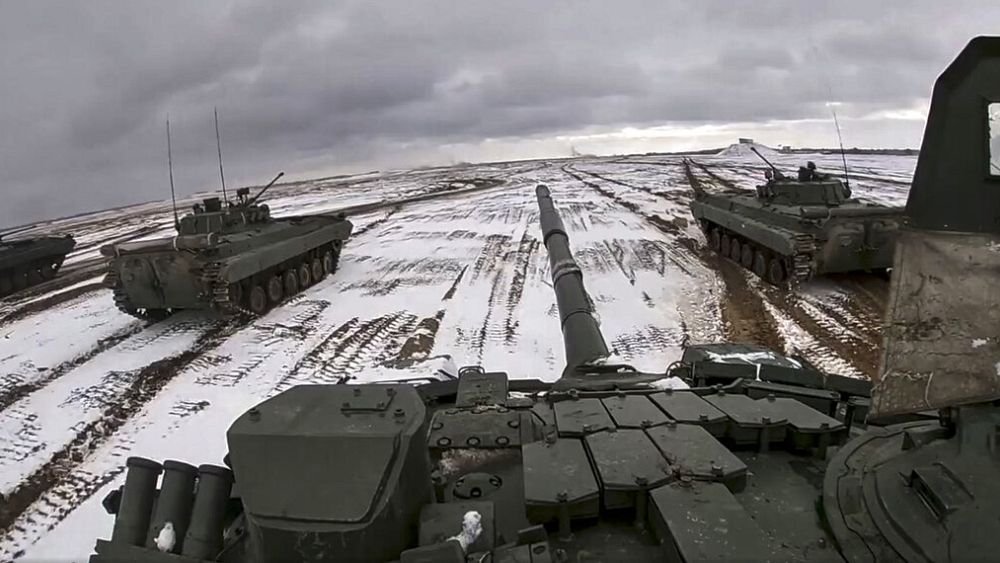
It was all quiet on the eastern front this week, despite some background noise outside of Ukraine.
Russia and Belarus began military drills near the Ukrainian border, while NATO allies stepped up troop deployments.
At the same time, top-level diplomacy continued every day of the week – without any sizable and visible success yet.
For now, the diplomatic push to avert a feared Russian invasion seems to be working.
So far, listening to some of the top players, like French President Emmanuel Macron, peace does still have a major chance.
“We will continue to act in the coming weeks with simple objectives. The first one is to avoid war,” Macron said. “The peace and stability of the European continent are our treasure and we consider it our duty to do everything to preserve it.”
Russian President Vladimir Putin also said, following a meeting of the two, that “they will do everything to find compromises that suit everyone.”
Some analysts have suggested that Putin’s window to attack Ukraine is closing rapidly, with the element of surprise gone and western allies seemingly fully prepared.
“We will be united. We will act together and we will take all the necessary steps and all the necessary steps will be done by all of us together,” Olaf Scholz, German Chancellor said this week.
Brussels resumes battle with Warsaw
On Tuesday, Brussels said it will start withholding EU payments to Poland over its failure to pay daily fines imposed by the bloc’s top court last year.
In September, the European Court of Justice (ECJ) ordered Warsaw to pay €500,000 per day for failing to follow a ruling which said operations must cease operations at its Turów lignite mine and power plant close to the Czech Republic’s border.
A spokesperson for the European Commission told Euronews that a notification had been sent to the Polish government on Tuesday that said the money would be taken in 10 days’ time from the country’s regular EU funds to offset the financial penalties imposed previously by the ECJ.
“The Commission has informed Poland that it would proceed with the offsetting of payments for penalties due under case C-121/21 Czechia v Poland on Turów lignite mine,” the spokesperson said.
“The offsetting is for penalties covering the period 20/9/2021-19/10/2021. The Commission will proceed with the offsetting after 10 working days from this notification,” he added.
Poland said it “will use all legal means to appeal”, saying that there is “no legal or factual basis” for the penalty.
The amount in question is said to total roughly €15 million for the stated period.
Mass microchip drive
Away from internal EU disputes, in a new and emerging front, Brussels announced plans to help the EU catch up with the increasingly competitive global tech race, unveiling a massive subsidy programme for semiconductors, the chips that power all sorts of electronic devices and have become a precious commodity in the midst of supply chain disruptions.
Under the name EU Chips Act, the European Commission aims to allocate €11 billion in public funds for the research, design and manufacturing of semiconductors, with the goal of mobilising a total of €43 billion of public and private investment until 2030.
The €11 billion will come from existing EU instruments, such as the research programme Horizon Europe and the recovery fund (Next Generation EU), and the financial plans that member states plan to roll out at the domestic level. Reaching the €43 billion mark will depend on how attractive the EU becomes for private investors.
In 2020, the bloc attracted only 3% of global investment for chip factories, but last year Intel Corp said it was willing to invest over €80 billion in Europe’s semiconductor industry over the coming years.
The European Commission’s ultimate goal is to expand the EU’s global market share from the current 9% all the way to 20% by 2030, an ambitious target that will become harder to achieve as worldwide demand intensifies and governments become more generous in injecting direct support.
“Securing the supply in the most advanced chips has become an economic and geopolitical priority,” said Thierry Breton, EU Commissioner for the internal market.
Maastricht turns 30
On Monday, one the EU’s foremost documents celebrated its 30th birthday.
February 7 1992 was the day representatives of the then twelve member states of what was then European Communities gathered in the Dutch city of Maastricht to give a new impetus to their decades-long but still incomplete project of economic and political integration.
“This Treaty marks a new stage in the process of creating an ever closer union among the peoples of Europe, in which decisions are taken as closely as possible to the citizen,” read the first article.
The Maastricht Treaty came at a most auspicious time for Europe: the Berlin Wall had fallen, the Soviet Union had collapsed and liberal democracy had reached its peak of popularity.
The auspicious circumstances called for a redesign of the European Communities, which were up to that point mostly focused on building a tariff-free, seamless market that would forever tie the destiny of its member states and prevent future armed conflicts.
Belgium, Denmark, France, Germany, Greece, Ireland, Italy, Luxembourg, the Netherlands, Portugal, Spain and the United Kingdom felt it was time to aim higher.
Seizing the moment, the twelve countries decided to create the European Union, a term that is widely used today but that back then lacked any legal power.